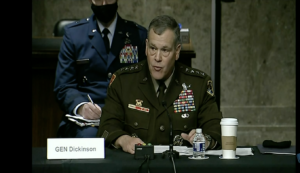“We need a new level of awareness,” Dickinson said.
Dickinson testified on Tuesday at a posture hearing in front of the Senate Armed Services Committee alongside Adm. Charles Richard, commander of U.S. Strategic Command.
U.S. Space Command’s traffic watchers at Vandenberg Air Force Base, California, currently track about 32,000 objects on orbit, including more than 3,400 active satellites. They estimate the probability of collisions and send warnings to satellite operators.
Dickinson noted that the three largest constellations of satellites today are operated by commercial companies: SpaceX, Planet and Spire.
“Commercial opportunities open new possibilities, but can also complicate access to the domain with the proliferation of mega constellations,” he said.
“The safety and sustainability of an increasingly crowded space domain grows more complex as commercial entities plan to launch thousands of satellites in the next few years,” Dickinson said. “The explosive growth of nano, micro, and small satellites will further stress our existing space surveillance networks.”
Senators on the committee, including Thom Tillis (R-NC), Tim Kaine (D-VA) and Jeanne Shaheen (D-NH), asked Dickinson for specific recommendations on how to address this issue.
Dickinson said Space Command is focused on improving “space domain awareness,” or knowledge of objects and activities in space. He said more resources are needed to track commercial traffic and also potential threats such as weapons that China and Russia could deploy to target U.S. satellites.
“We need to characterize what we’re seeing in the space domain,” said Dickinson.
He said Space Command is expanding its space surveillance network by integrating data from ground and sea-based radar used by the Army and the Navy for missile defense.
Civil and commercial spaceflight safety responsibilities now carried out by Space Command should be transitioned to the Department of Commerce in 2024, Dickinson said.
The Trump administration ordered the transfer of responsibilities in a 2018 policy directive but the transition has been slow mostly because Commerce does not have the resources to take on space traffic management.
Shaheen, who also sits on the Appropriations Committee, said lawmakers would like to know how much money Commerce needs to do this task. He asked Dickinson how much the Air Force and Space Force spend today on space traffic management. Dickinson said he would get back to her.
In written testimony, Dickinson said he urged Congress to “afford the Department of Commerce the resources they need to accomplish the civil and commercial spaceflight safety mission.”



